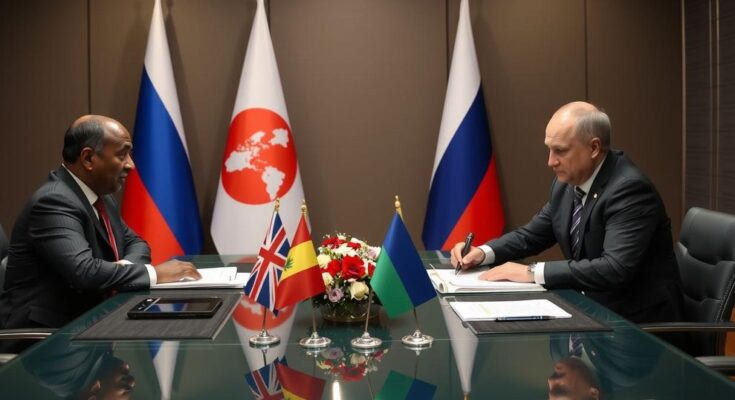Burundi has signed a Memorandum of Cooperation with Russia on nuclear energy during the Russia-Africa Forum. The agreement focuses on developing Burundi’s nuclear infrastructure and includes projects on radiation safety and research in nuclear applications. Burundi aims for energy independence through the partnership, alongside other African nations exploring similar ties with Russia for peaceful nuclear energy use.
Burundi and Russia have formalized an agreement on nuclear cooperation during the Russia-Africa Economic and Humanitarian Forum held in St Petersburg. The Memorandum of Cooperation (MoC) was signed by Burundi’s Minister of Foreign Affairs and Development Cooperation, Albert Shingiro, and Rosatom’s Director General, Alexei Likhachev. This agreement encompasses a variety of projects aimed at establishing and enhancing Burundi’s nuclear infrastructure, ensuring legal regulations surrounding nuclear and radiation safety, and fostering fundamental research in peaceful nuclear applications across multiple sectors including industry and healthcare.
Moreover, the agreement will facilitate the formation of a joint coordination committee to oversee the exchange of experts and the sharing of scientific and technical information, alongside the provision of essential equipment and materials. Earlier this year, a Burundian delegation led by President Evariste Ndayishimiye toured the Leningrad nuclear power plant, appreciating its potential contributions to the ‘Burundi-2040’ initiative, which aspires to secure energy independence and diversify energy consumption within the country.
Since signing its initial Country Programme Framework with the International Atomic Energy Agency in 2016, Burundi has been actively pursuing the peaceful utilization of nuclear energy. This includes recent legislative efforts aimed at ensuring the safe and secure use of nuclear technologies. Other African nations, such as Ethiopia and Zimbabwe, are also exploring nuclear cooperation with Russia, bolstered by Russia’s commitment to assist these countries in establishing their own peaceful nuclear energy frameworks once they meet necessary legal and regulatory standards.
The backdrop to Burundi’s agreement with Russia on nuclear cooperation lies in a broader context of African nations increasingly seeking to harness nuclear technology for peaceful purposes. Both Burundi and Russia have vested interests in maximizing the utility of nuclear energy, particularly in terms of energy security and agricultural development. The Russia-Africa Economic and Humanitarian Forum serves as an important platform for discussing such collaborative efforts. Additionally, the African continent exhibits a myriad of approaches towards nuclear power, with countries like Egypt already advancing their nuclear infrastructure under the guidance of Rosatom, Russia’s state nuclear energy corporation.
In conclusion, the recent agreement between Burundi and Russia represents a significant step towards advancing nuclear cooperation for peaceful applications in Africa. It not only highlights Burundi’s commitment to enhancing its energy independence but also underscores the collaborative potential between African nations and Russia in utilizing nuclear technology. With ongoing projects and discussions involving other countries, this agreement could pave the way for a broader renewable energy future linked to nuclear applications across the continent.
Original Source: world-nuclear-news.org




